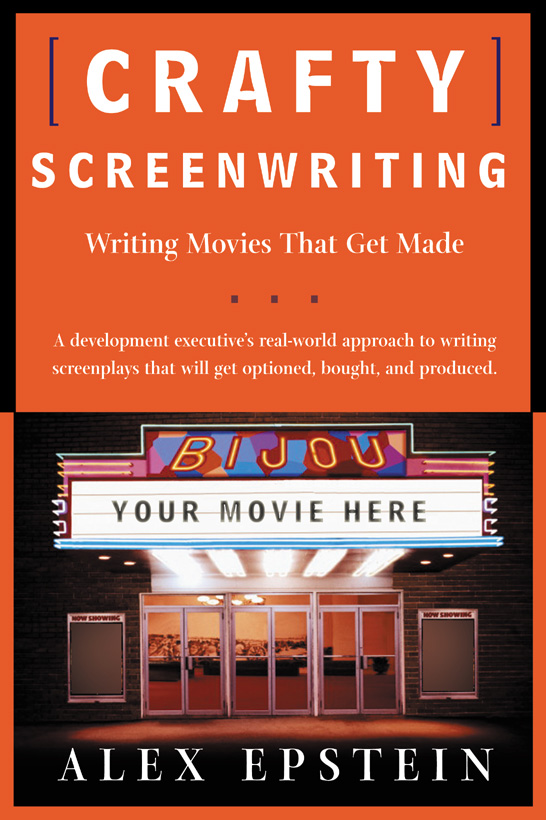

If you've seen the movie Adaptation and followed the angst and anguish of the Kaufman brothers/doppelgangers as played by Nicholas Cage, you know that writing a screenplay, far from the glamour and hype, is fraught with peril. In fact it is so precarious a task as to have spawned an industry of classes (modeled after those taught by the legendary Robert McKee, played by Brian Cox in the movie) and shelves full of how-to books at Barnes & Nobles. One such is Crafty Screenwriting: Writing Movies That Get Made by Alex Epstein. But unlike so many others, this book does not offer a fantasy vision of life in the Hollywood Hills. This book is grounded in solid, user-friendly advice, from the definition and development of a "hook" to negotiations on your option agreement. If you in earnest want to get tips on how to write a bankable, workable, successful screenplay, read this book.
First, Epstein is a realist. He wants to separate the men from the boys. He wants to make sure you know what you are getting yourself into. He talks about passion above all else. Do it if you must. The allure of screenwriting is obvious. Who doesn't dream of tossing off a drama of say, one's own fabulously interesting life, with the hopes of winning fame, fortune, or at least having Jack Nicholson or Meryl Streep play the lead? As in any industry only a few names float to the top, so it is not assured that you will be the next Charlie Kaufman or Steve Zaillian. Then there are writers claiming whole careers around writing screenplays that have never been made; are they so egoless as to be laughing all the way to the proverbial bank? As Epstein makes very clear, "this book is about writing movies that get made."
Second, he is no nonsense and takes you through the strategies, categories, genres: for example, do you know the difference between a horror movie and a terror movie? "In a terror movie, the villain violates the laws of man. In a horror movie, he or it violates the laws of nature. In a terror film, you're terrified; in a horror film, you're horrified." Now you know. And one beat more, "If your picture is a horror film, you'd better scare the pants off your audience."
Taking the category of submarine movies, he pares them down: U-571 is an action picture or possibly a war movie. Das Boot is a drama. Crimson Tide is a thriller. Why do we need to make these distinctions? Because "Genre is the goods you must deliver to make your audience feel satisfied. No matter how brilliant your movie is on its own terms, if you don't deliver the goods on the genre, you'll frustrate your audience and your picture will fail." That's why!
Third, Alex Epstein is down to earth, and has a respectful irreverence for the seriousness of the task at hand. Often his tone is so funny, he takes the obvious and makes you see it anew: on encouragement: "Praise from fellow writers will mean more to you than praise from your mom." Or, he can get really serious about his cardinal rules: "Never, ever show an agent, producer, director, or actor your material before it's as good as you can make it. No, not even if they're begging for it."
As a seasoned development executive, screenwriter, and television story editor, Alex Epstein knows this turf: You believe him when he asserts: "Write what you love. Write a movie you'd like to see. But never write from hunger." By which he means, writing purely for money. "If you write from love and don't sell it, you get to keep the love. If you write from hunger, all you're left with is the hunger."
After reading this book, the one question I'd like to ask Alex Epstein is, will he do lunch?
Regina Weinreich's most current publication is Jack Kerouac's Book of Haikus . She lectures at Columbia University on film, and has directed and produced a documentary, Paul Bowles: the Complete Outsider. © 2003 by Regina Weinreich.